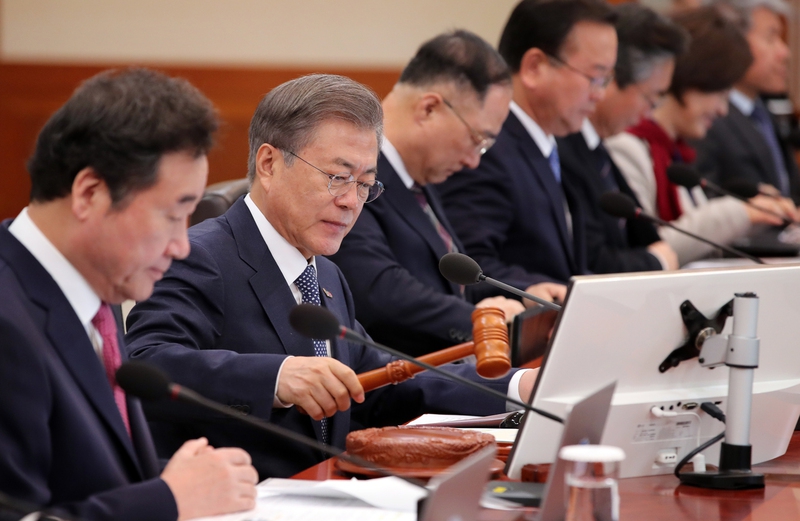 |
|
South Korean President Moon Jae-in presides over a Cabinet meeting at the Blue House on Mar. 19. (Blue House photo pool)
|
Blue House burdened by collapse of Hanoi summit and arrest warrant of former environment minister
Since the North Korea-US summit in Hanoi in late February concluded without an agreement, South Korean President Moon Jae-in has faced stiff challenges both at home and abroad. As part of an ongoing dispute with the US, North Korea abruptly withdrew its staff from the inter-Korean joint liaison office in Kaesong. To make matters worse, South Korean prosecutors issued an arrest warrant for former Environment Minister Kim Eun-kyung; while reform bills that the Blue House has been stoutly supporting, which aim to set up an office to investigate crimes by senior officials and to divide investigative authority between the police and the prosecutors, may never even come up for debate in the National Assembly. On Mar. 22, North Korea took the unexpected step of withdrawing its staffers from the inter-Korean joint liaison office in Kaesong. Since its establishment on Sept. 14, 2018, in accordance with an agreement reached in the Panmunjom Declaration on Apr. 27 of the same year, the liaison office had served as a channel for inter-Korean communication that was available around the clock. This is a troubling development for the Blue House, which had sought to use inter-Korean relations as a driver for resolving the impasse in North Korea-US relations. During a meeting of the National Security Council on Mar. 4, Moon asked his officials to look for ways to aid North Korea-US dialogue by developing inter-Korean relations within the framework of sanctions and to quickly move forward with inter-Korean cooperation projects that had been agreed to in the Panmunjom and Pyongyang joint declarations. On Mar. 17, a senior official from the Blue House said that officials were giving a lot of thought to how they could make use of the baton they’d been handed. They were planning to develop inter-Korean relations through implementing sections of the Comprehensive Military Agreement (CMA) announced on Sept. 19, including demolishing DMZ guard posts, working with the North Koreans to recover POW/MIA remains from the Korean War, and allowing civilians ships to navigate freely around the estuary of the Han River. But North Korea’s withdrawal from the joint liaison office has put the Panmunjom Declaration agreements into jeopardy. The Blue House is reportedly in contact with North Korea to explore the options of sending a special envoy to the North or to hold an informal summit at Panmunjom, but the two sides haven’t apparently gotten much traction yet. Amid all this, a trip to Moscow and Vladivostok by Kim Chang-son, chief secretary of the North Korean State Affairs Commission secretariat and Kim Jong-un’s protocol officer and de facto chief of staff, has prompted speculation that Kim Jong-un will soon be paying a visit to Russia. If North Korea seeks a breakthrough to the impasse through strengthening its relations with China and Russia, some fear, inter-Korean communication may be put on the back burner. The most troubling factor on the domestic front is prosecutors’ arrest warrant for former Environment Minister Kim Eun-kyung. Prosecutors have accused Kim of abusing her authority and preventing the exercise of lawful rights, arguing that the Blue House and the Environment Ministry attempted to force the resignation of executives at agencies reporting to the ministry who’d been appointed by the Park Geun-hye administration. The Blue House has argued that this is fundamentally different from the blacklist drafted by the Park administration, because Kim was exercising her legal oversight authority when she ordered audits of some of the ministry’s subordinate agencies. But if the court’s pre-detention hearing of Kim, which is scheduled for Mar. 25, leads to her arrest, it will indubitably create a moral conundrum for the Moon administration. National Assembly standoff created by LKP’s seismic shift further to the right The standoff in the National Assembly is another frustrating factor for the Blue House. Now that Liberty Korea Party (LKP) leader Hwang Kyo-ahn and floor leader Na Kyung-won have pushed the party’s hardline stance even further to the right, it’s unclear whether the permanent deliberative body representing the ruling and opposition parties and government institutions will be able to hold regular meetings at this point. The Blue House and the National Assembly had agreed to hold those meetings once a quarter, but since the first meeting on Nov. 5, 2018, they’ve been unable to schedule a second one. “Once the deliberative body has met regularly for a number of times, it will become a binding framework for dialogue and communication, but that’s unlikely to happen right now,” said a senior official at the Blue House. The establishment of a senior official investigative office and the adjustment of the investigative authority of the prosecutors and police – which the Blue House has treated as key reform initiatives – also have an uphill climb in the National Assembly. These two items have been bundled with the ruling and opposition parties’ debate over putting electoral legislation on the fast track, and there’s a sharp disagreement between the Democratic Party, which is determined for the new investigative office to have the power of indictment, and the Bareunmirae Party, which is resolutely opposed to that. By Seong Yeon-cheol, staff reporter Please direct comments or questions to [english@hani.co.kr]






